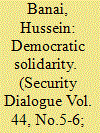| Srl | Item |
| 1 |
ID:
124776


|
|
|
|
|
| Publication |
2013.
|
| Summary/Abstract |
This article aims to temper the cross-disciplinary enthusiasm for democracy-promotion programs in the light of the recent anti-authoritarian upheavals in the Middle East. It offers a wide-ranging critique of mainstream instrumentalist arguments (i.e. that democracy leads to peace, development, and justice), which are hampered by universalist generalizations about democratic government - in other words, by a tendency to separate democratic values and institutions from their orientation within particular political and historical contexts. In the place of such arguments, it offers an alternative model of democratic solidarity premised on the belief that the social construction of democratic norms - and especially the reflective processes that mediate their internalization - has a direct bearing on the legitimacy of political forms and decisions. Through a detailed analysis of the trials and tribulations of US democracy-promotion programs in the Arab and Muslim world, it further argues that the provision of any outside assistance to democratic transitions in the Middle East will need to involve the twin tasks of understanding the quite complex and contextual struggle for rights and freedoms in each particular society, and providing the necessary space and resources for achieving democratic legitimacy.
|
|
|
|
|
|
|
|
|
|
|
|
|
|
|
|
| 2 |
ID:
134271


|
|
|
|
|
| Summary/Abstract |
This article is an inquiry into the relationship between diplomacy and public imagination in world politics. Neither the conventional conceptions of diplomacy as the art or practice of negotiations among groups or states, nor more critical meditations on the mediation of conflictual narratives, it is argued, can adequately explain the very subjective foundations of diplomacy as a normative practice in world politics. This glaring oversight is in large part due to the lack of engagement with the varied contours of historical meaning and memory that condition human thoughts and relations in world society. Diplomacy, I argue, is very much implicated in the normative dictates of public imagination: namely, the public understanding of history which arises from the exclusionary—and hence often conflicting—cultural narratives about nationhood, justice, language, rights, personhood, et cetera that remain the perennial facts of human relations in world society. As such, the practice of diplomacy can be reconceived as a paradox: an intervention into, and an enabler of, exclusivist narrations of public imagination in world society.
|
|
|
|
|
|
|
|
|
|
|
|
|
|
|
|